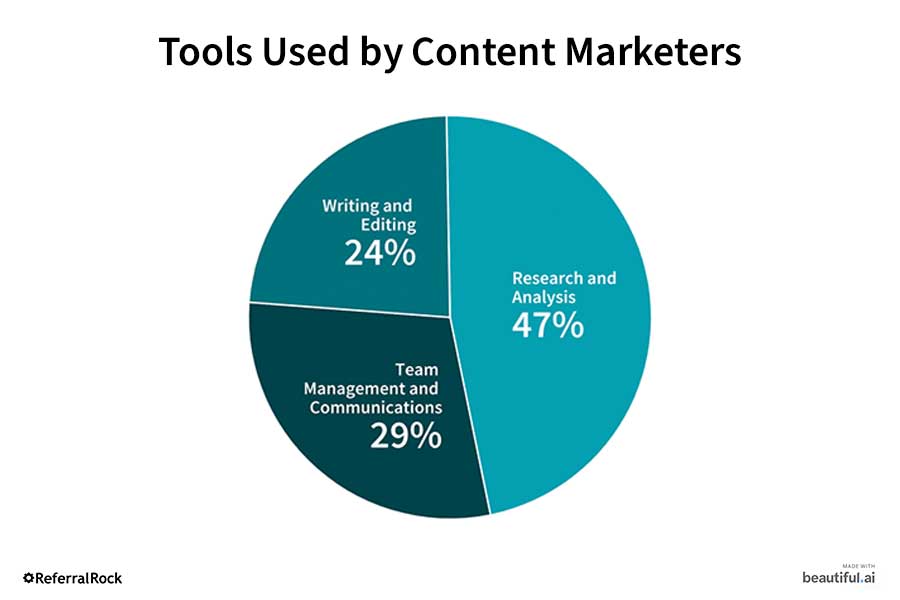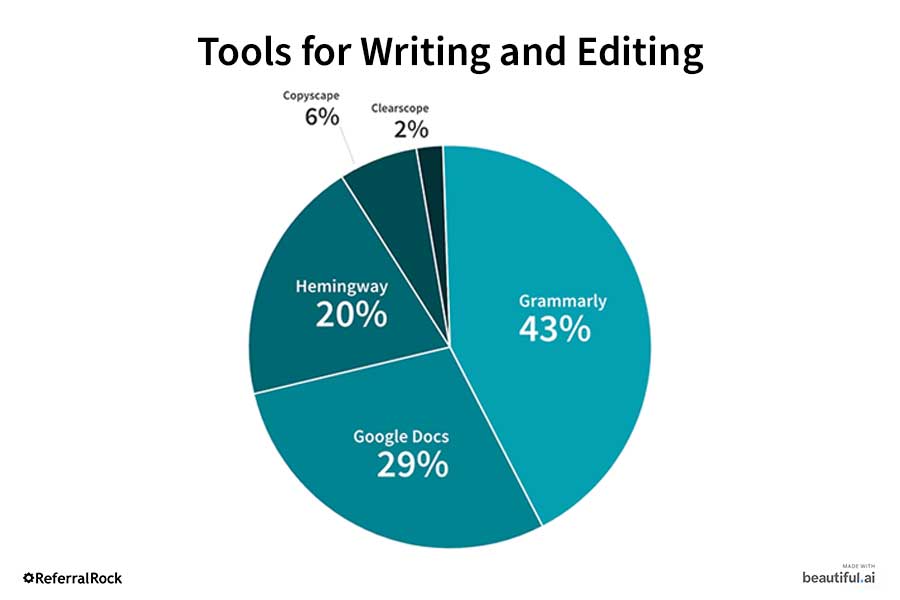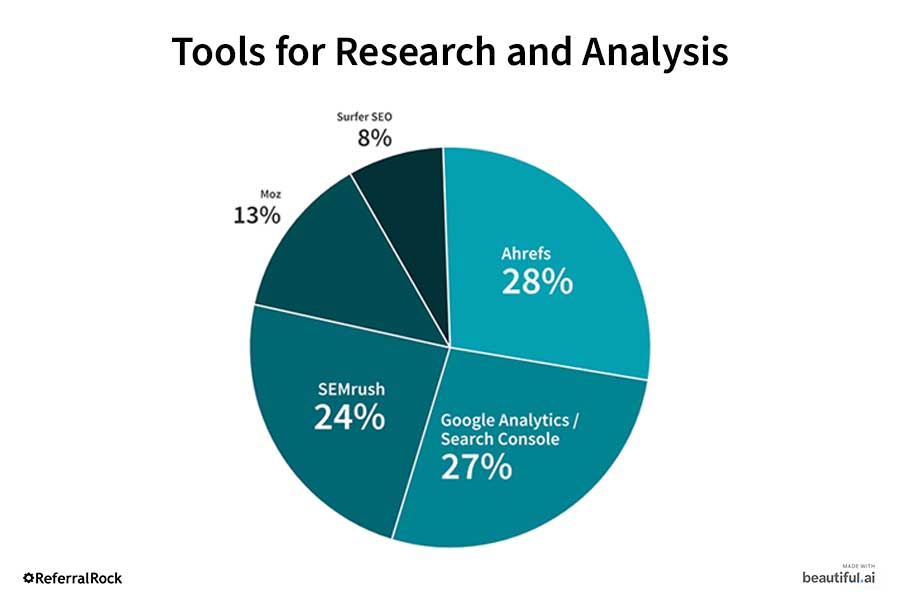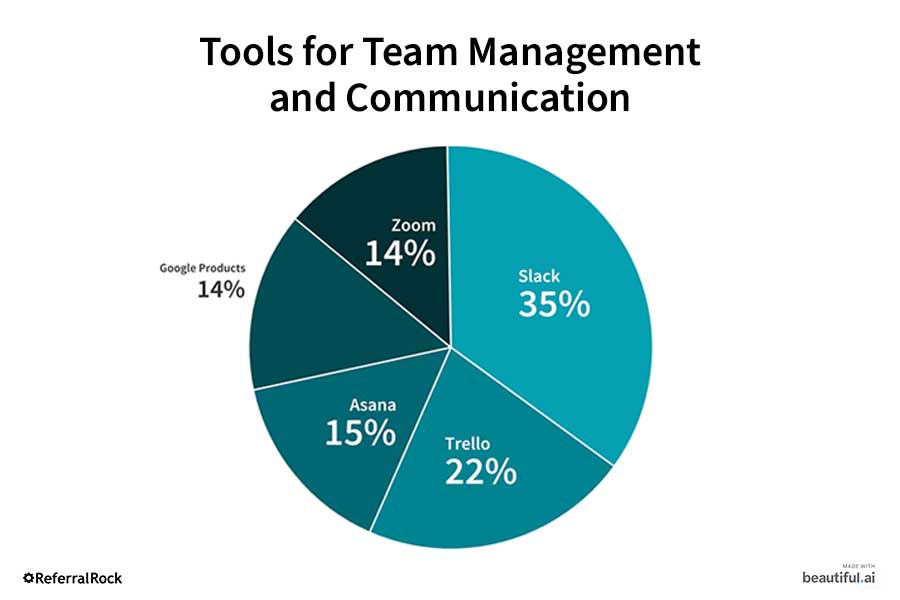When I first started as a writer, the only “content marketing tool” I used was Microsoft Word. I’d jot down notes on paper during interviews, and then type everything out as soon as I got to my laptop.
As almost all publishing moved online, so did everything else – brainstorming, proofreading, sharing notes, etc. During the year I spent as a freelancer, each company I wrote for had their own set of preferred content tools. (The first ones I remember using were Capitalize My Title and Clearscope.)
Now, as a content marketing manager, my toolkit is full of programs that go way beyond grammar and spell checks. Whether it’s analyzing keywords, tracking page views, or coming up with the catchiest headline, there’s a tool to help get the job done.
But what are content marketers actually using?
Instead of a “best of” list (Brian Dean already has a great one), I wanted to know the exact tools marketers rely on to achieve their goals. Out of all the options, which ones are mainstays on a content marketer’s screen?
My research process was simple – I posted a three-question survey to two different content marketing groups.
In less than a week, there were 105 submissions with mentions of about 50 unique content marketing tools. After sifting through them, what was most interesting wasn’t just the individual tools, but how marketers used the tools in combination.
“For some tools, it’s the level of customization offered. For others, it’s how they enable me to do my best work and keep me organized,” explains Hannah Wiginton, a content writer and marketer. “A tool worth keeping is one that will have a positive impact on my productivity and move me toward my goals.”
Below are the three things I learned from exploring today’s content marketing toolbox (as well as a list of the all the mentioned content tools):
1. Content marketers use a lot of tools
An average of nine, in fact. Most content marketers use between 8-12 software tools on a regular basis, which makes sense when you consider all the different areas in a content marketing strategy.
To get a better idea of where content marketing tools are used, I divided them into three categories:
- Tools for research and analysis (SEO, keywords)
- Tools for writing and editing
- Tools for team management and communication
We see how all the tools used by content marketers break down into the three categories.
Within these categories, the names that came up most often were Ahrefs, SEMRush, Moz, Grammarly, Hemingway, Slack, Trello, and Asana.
Google products are also a fixture in most content marketing teams. Not just for analytics and search data, but also for writing and communicating within teams.
- 57% get data from a mix of Google Analytics, Search Console, and/or Keyword Planner
- 60% write and edit articles on Google Docs
- 15% communicate through Google Meet, Hangout, or Chat
What makes Google products so popular is convenience. Each product integrates seamlessly with one another, and can be accessed by anyone on your team through multiple devices.
Quick access is an important feature of the tools used most by content marketers. Several of the analytics tools are installed as browser extensions and CMS plugins, and almost all writing and editing tools run straight from your browser.
The top writing and editing tools, shown in the chart below, are all web-based products (although Hemingway also has a paid desktop tool.).
When deciding what tools to keep, Brendan Hufford of SEO for the Rest of Us, asks a straightforward question: “Whether I need it in my daily or weekly activities. If it’s ingrained in my process, I keep it. If I find it’s more of a ‘nice to have,’ I probably dump it.”
2. Most content marketing tools focus on data
Out of all the tools the average content marketer uses, 47% of them are for SEO tracking and analytics.
Content marketers look at an average of 3–4 SEO software tools (although the highest response reached 14).
In addition to having the greatest quantity, the tools used for SEO reveal the widest range. Marketers use well-known programs, such as Ahrefs, Moz, and SEMRush. But they also use newer names, like AtomicReach and Frase (both AI-powered content software), and niche tools, like AnswerThePublic (a search listening tool).
There’s also a rise in using visual content tools (i.e., Milanote, Venngage), which help content marketers plan their site using text, images, links, etc. rather than a flat sitemap or linear document.
It turns out, most marketers use multiple SEO tools for a similar purpose. It’s common for a content team to use BuzzSumo and Ubersuggest for keyword research, or check both Screaming Frog and SE Ranking to improve on-site SEO.
With so much available data, it’s important to “cross-reference any findings or whatever the tools tell you with your own common sense and what you see is working for other websites,” advises James Taylor of Dispense Digital.
The purpose of all these SEO tools is to provide data. It’s still up to the content marketer to weigh these findings against other factors, like team goals and capabilities, and arrive at their own insight.
That being said, experimenting with your SEO stack can be done with a low risk and potentially great reward. Most tools offer free plans, with enough basic functionality to see value.
Plus, once the basic settings are in place, it’s easy to find what you need. So if a marketer wants to try a new SEO tool, it doesn’t cause a big disruption.
On the other hand, tools for writing or management are typically used by an entire team. Articles and tasks are often shared between members, and adding too many tools can get confusing.
Most content marketers use one of the management tools below as a useful, long-term solution.
3. Marketers use a high-low mix of content tools
While content marketers are open to trying new tools, they stick with the ones that give them the most relevant, actionable information.
Does the program suggest easy ways to improve a site? Can it reveal any typos before a post is published? These are the types of tools content marketers will use to make their work easier.
“I look for anything that will expedite the content creation process for me. Google Docs expedites editing. Figma expedites graphics creation, SEMRush expedites keyword research, etc.,” says Matthew Speiser, a Marketing Content Manager at Knotch.
An interesting note is the most-used tools are either the more expensive paid platforms or totally free.
The top ten tools from this survey are perfect examples of this contrast (see the table below). Each one offers both paid and free versions or free tools.
As it turns out, the tools most marketers opt to pay for are the more expensive platforms – particularly ones that inform their content strategy. These are then combined with several free tools to further develop, write, and manage production.
This results in a very diverse monthly spend among content marketers. Depending on how the tools are structured, a content marketer can spend anywhere from tens to hundreds of dollars a month.
| Content marketing tool | Starting price (per month) | % of marketers with paid plans (out of the total who use the tool) |
| Ahrefs | $99 | 45% |
| SEMrush | $99.95 | 32% |
| Asana | $13.49/user | 24% |
| Zoom | $14.99 | 22% |
| Moz | $99 | 17% |
| Trello | $12.50/user | 13% |
| Grammarly | $11.66 | 9% |
| Hemingway | $19.99 (one-time fee) | 8% |
| Slack | $8/user | 0% |
| Google Analytics* | ~$150k/year | 0% |
* Aside from Google Analytics, other Google products weren’t included in the list, as they are part of the Workplace suite.
Tools of the trade
While these three categories cover the bulk of content marketing tools, many marketers also mentioned programs for creating graphics, building email lists, and generating leads.
Every content strategy is different, and every team requires a different set of tools. To round off this article, I included a list of the tools mentioned by at least five marketers.
The following is a snapshot of the tools marketers get the most value from (in order of most used), and a great starting point if you’re looking to change up your content toolkit.
| Research and analysis | Writing and editing | Team management and communication |
| Ahrefs | Grammarly | Slack |
| Google Analytics/Google Search Console | Google Docs | Trello |
| SEMrush | Hemingway | Asana |
| Moz | Google Sheets | Google Meet/Google Hangout |
| Surfer SEO | Copyscape | Zoom |
| UberSuggest | Canva (for graphics) | |
| Yoast | Loom (for videos) | Airtable |
| AnswerThePublic | Clearscope | Notion |
| ScreamingFrog | Colorcinch (for photos and custom graphics) | ClickUp |
| Google Keyword Planner | Basecamp | |
| Keyword Everywhere | ||
| BuzzSumo | ||
| PageOptimizer Pro | ||
| Google Trends | ||
| Frase |








